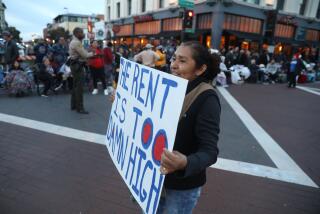Ryan lays out Romney vision for the poor in Cleveland speech
The poor aren’t often discussed much on the campaign trail; they’re not generally a swing vote or a hot-button issue that motivates voters to get to the polls.
Though ads might mention falling incomes or candidates’ positions on government programs, it is middle-class voters, rather than the poor, who are often the laser focus on the campaign trail and in debates.
But it’s an issue the Mitt Romney campaign thinks is worth mentioning in the final weeks of the presidential race, as Paul Ryan visited Cleveland State University on Wednesday to deliver an address on upward mobility and the economy, telling the audience that “America’s engines of upward mobility aren’t working the way they should.”
Still, Ryan didn’t add much new to the issue in his speech, focusing on getting government out of anti-poverty and education programs and on how Romney would create jobs in the nation, all long bedrock conservative principles.
“In recent years, we’re still trying to measure compassion by how much government spends, not by how many people we help escape from poverty,” Ryan said, standing on stage in a suit and green tie, with three American flags behind him.
Rather than spend trillions of dollars on means-tested government programs, he said, “there has to be a balance: allowing government to act for the common good, while leaving private groups free to do the work that only they can do.”
Ryan hit on an issue of government dependency that emerged as a campaign issue after Romney’s comments about the 47% of Americans dependent on government benefits. “This top-down approach created and perpetuated a debilitating culture of dependency, wrecked families and communities,” he said.
When laying out his and Romney’s ideas for how upward mobility could be achieved, he talked about the role of community in “a vision based on real reforms for lifting people out of poverty,” echoing remarks on civil society he made before the Republican National Convention in a rally in his hometown of Janesville, Wis.
Then and on Wednesday, he focused on how Americans come together after tragedy to look out for one another, explaining that communities, rather than the government, should look after people. He also mentioned Romney’s activity as a lay pastor in his church as an example of the importance of being involved with community.
INTERACTIVE: Battleground states map
“He’s the type we’ve all run into in our communities,” Ryan said. ”Americans are a compassionate people, and there’s a consensus in this country about our fundamental obligations to society’s most vulnerable.”
Ryan pledged to restore parts of welfare reform that he said had been weakened since the mid 1990s, and suggested giving states more power to administer anti-poverty programs including Medicaid and food stamps (food stamps are administered at the state level already).
He also plugged education reform, suggesting that parents should have more choice in where their children go to school. He gave shout-outs to people such as Bob Woodson, a community activist who was a fellow at the American Enterprise Institute, and the late Jack Kemp, who frequently advocated for tax cuts and inner-city enterprise zones.
Ryan also stressed the need to create jobs by cracking down on countries that cheat at trade and by cutting taxes and opening energy resources, all frequent Romney-Ryan talking points. He ended the speech with an appeal to those left behind by the economy.
“Whether we are rich or poor, black, brown or white, American by chance or by choice, we are one nation, rising or falling together,” he said. “That is the promise of America, and we can make it real in the lives of the many who feel left out. To all those Americans, I ask you to support our campaign, because our cause is yours, and yours is ours,” he said.
POP QUIZ: ‘Daisy,’ other famous campaign ads
It’s unclear whether Ryan’s appeal, coupled with Romney ads that emphasize how far incomes have fallen during the Obama administration, could woo voters in poverty, who traditionally support Democrats. He did speak specifically about the inequalities present in educating African American and Latino children, and about the problems existent when “40% of children born to parents in the lowest fifth of earners never know anything better.”
But it may not be as resonant in Ohio, where the unemployment rate has fallen consistently and now stands at 7%, down from 10.6% in 2009, when Obama took office.
Follow Politics Now on Twitter and Facebook
Twitter: @AlanaSemuels
More to Read
Get the L.A. Times Politics newsletter
Deeply reported insights into legislation, politics and policy from Sacramento, Washington and beyond. In your inbox three times per week.
You may occasionally receive promotional content from the Los Angeles Times.







